UW elects new student government leaders
The winning presidential ticket sought endorsements from smaller student organizations, breaking with a long-standing tradition that prioritized endorsements from Greek councils and other large orgs.

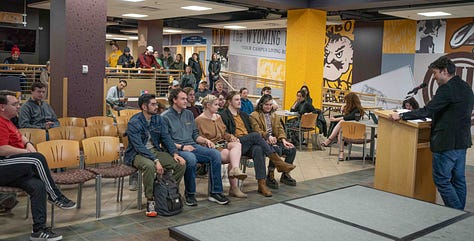

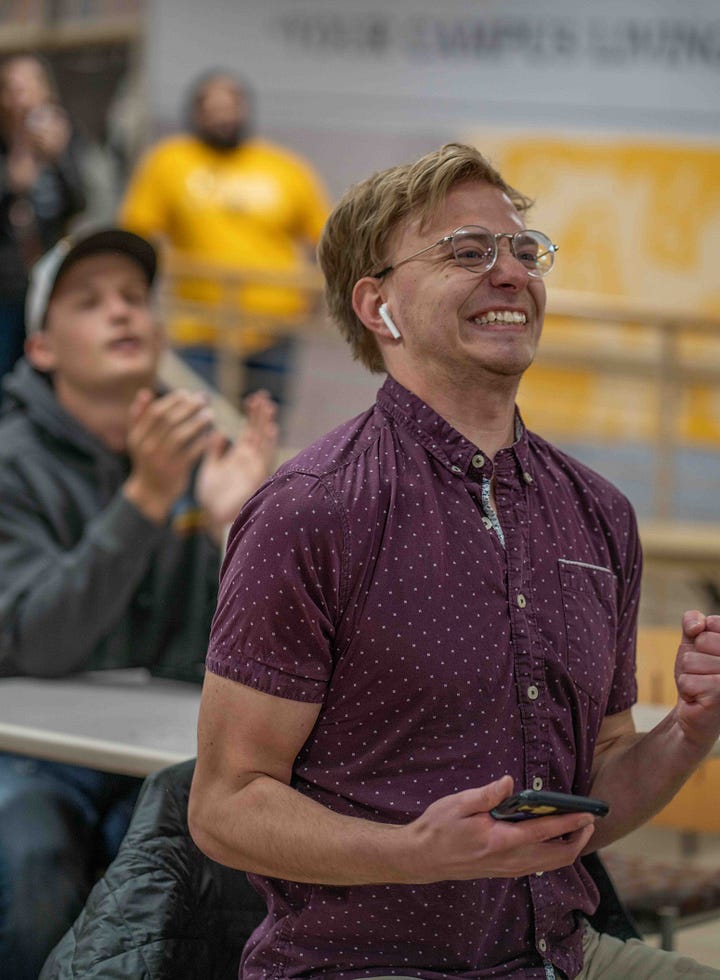
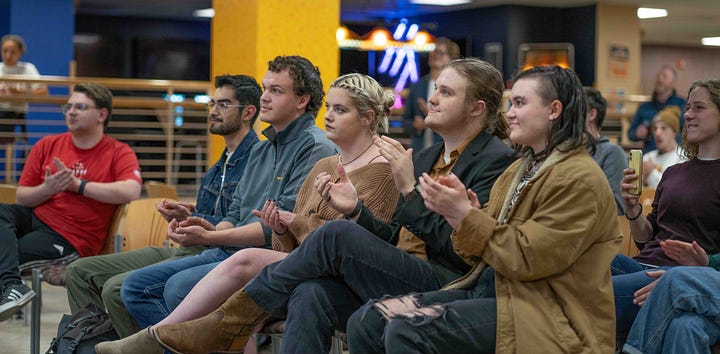
University of Wyoming students elected Saber Smith and Jessica Petri to serve as the student government’s next president and vice president.
The Associated Students of the University of Wyoming (ASUW) student government announced Friday that the Smith-Petri ticket was the top choice for nearly one-third of students who cast ballots this election. Smith and Petri ran a semi-virtual ticket — as Petri was in Spain for her study abroad and plans to return later this summer.
They campaigned on the slogan “ASUW sucks, let's fix it,” while running on a platform of fiscal responsibility with student funds.
“It's definitely presented its difficulties running a campaign with a semi-virtual ticket due to a lack of face-to-face interaction,” Petri said on the campaign trail earlier this month in an interview with the Laramie Reporter. “It also provided some advantages though, as the time zone differences allows one of us to continue to campaign, make materials, and outreach while the other sleeps, resulting in the campaign truly running almost 24/7.”
Smith and Petri made it work despite the distance. Smith even flew to Spain before the pair kicked off their campaign, taking photos and pre-recording campaign materials with his study abroad running mate.
The other presidential tickets running this year hit on similar topics, promising to tackle parking issues, work with UW administration for medical amnesty policies on campus, improve student wages on campus, and more ambitiously lobbying the state government on behalf of students.
Smith and Petri would come out on top though, receiving 31 percent of the 1336 ballots cast by UW students in the election this month.
ASUW saw a 53 percent decrease in voting turnout from spring 2022, but last year saw the highest turnout in the last two decades and the number fluctuates wildly from year-to-year. No matter the annual turnout, ASUW has a significant impact on student life, from determining how student fees are spent to representing the student body to the state at large. Earlier this semester, the student government ran a lobbying effort and passed several recommendations to the state legislature on key legislative items that will or would have affected student life.
The student population also elected its new senate — deciding a total of 21 student senators elected at-large. Among those new senators is ASUW's self-proclaimed youngest-ever-elected senator Sofia Gomelsky — a Laramie High School student with just enough college credits to qualify and run in the college election.
Reaching the voters
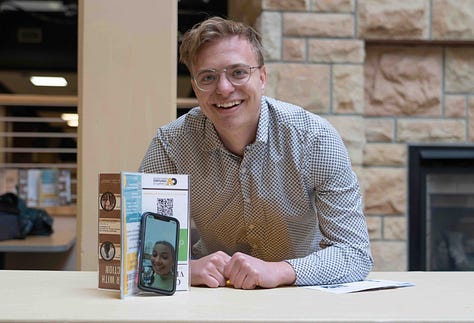

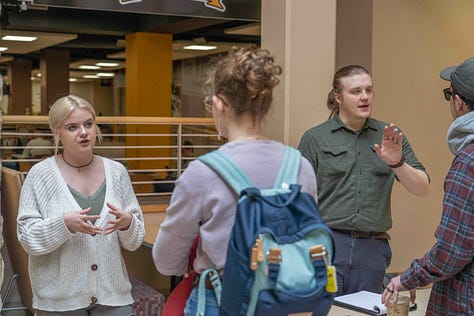
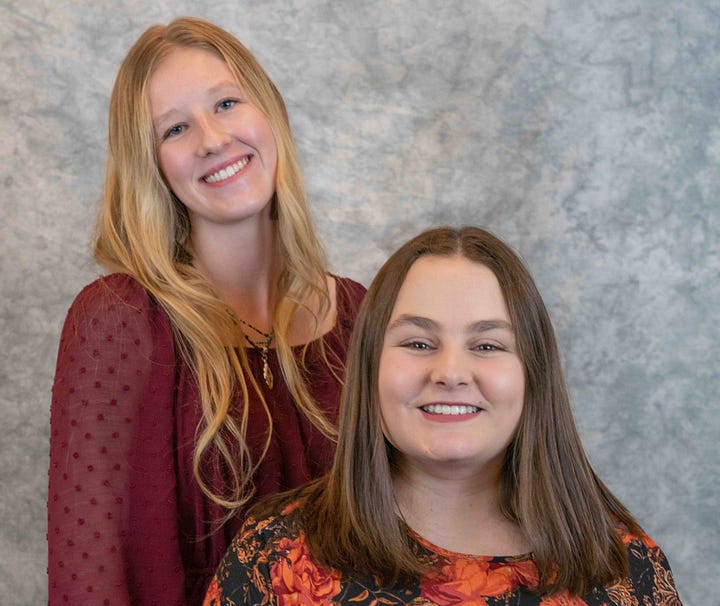

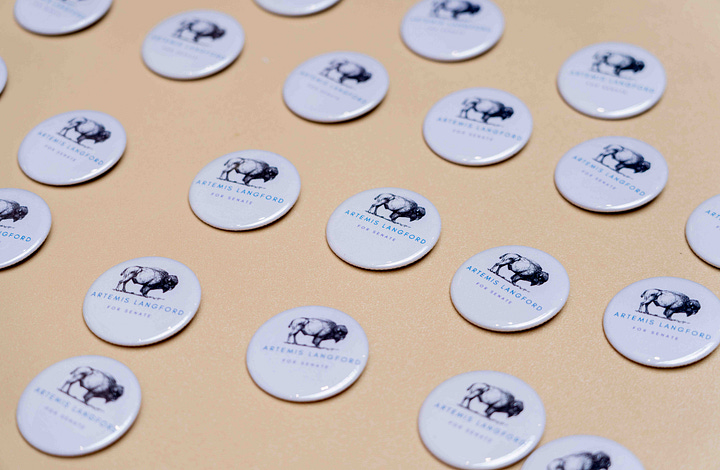
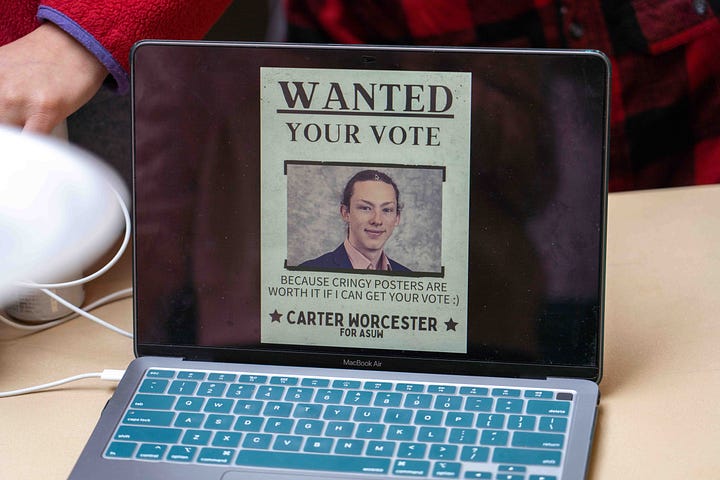
Historically ASUW candidates focus on earning endorsements from student organizations and other, less organized factions of the UW campus. A group endorsement signals to its members that a particular candidate or ticket has the best interests of their group at heart and encourages members of that group to vote for that particular candidate or ticket. Similar to national elections, scoring an organization’s endorsement can mean winning several votes at once.
Although several hundred student organizations are on campus, student campaigns typically target the largest groups. At UW, those are the Greek councils, Queer Community Coalition, Christian Navigators, International Student Association, and the Student-Athlete Advisory Committee.
The Smith-Petri ticket seemed to take a different approach — focusing on a multitude of smaller student organizations in addition to the larger organizations. This strategy appears to have worked as their campaign received the most endorsements overall, but got less interest from larger student organizations. Many student organizations provide a ranked list of candidates due to the presidential race being decided by a system of ranked choice voting. The Smith-Petri ticket ranked low on these lists relative to the other presidential tickets. That includes receiving the lowest-ranked endorsements from the UW fraternity and sorority councils — an endorsement traditionally coveted by ASUW presidential candidates.
According to outgoing ASUW Vice President Hunter Swilling — who holds a 20-year record for the highest number of votes received in an ASUW election — Greek life groups are often the most targeted groups on campus for campaigners, despite only representing around 4% of the student population.
“There's about 537 people in Greek life, give or take; it varies throughout the years,” Swilling said. “Which, given there's about 10,500 voting students, is statistically a relatively tiny proportion — but it's long been thought that they vote in a higher proportion than the general student populace.”
With the vote count varying from 800-2,800 over the past several years, an endorsement of a voting block of around 500 can be game-changing — but it’s not a guaranteed path to victory, as Smith and Petri demonstrated this year.
This year also saw the rise of another major group of influential voting blocks in UW student elections — among them, the UW student chapter of Turning Point USA, a right-wing student group with chapters across the country. Turning Point at UW can often be found tabling across the UW campus, advocating for conservative viewpoints and hosting guest lectures by national speakers who share similar viewpoints.
Two Turning Point USA members won senate seats this year, including the chapter's president Gabe Saint, who ran on a campaign promising to protect free speech at the university and break up the elitism of ASUW.
Turning Point gave Smith and Petri its top endorsement, ranking them above the three other presidential tickets. Several other presidential tickets rejected Turning Point’s endorsement, but Smith and Petri accepted theirs with the following statement on their social media.
“We’re running on a non-partisan platform,” said Smith and Petri on their campaign Instagram. “While we do not agree with all views of Turning Point, we still believe fundamentally in unifying ALL parts of campus and fighting for systems of change.”
An ASUW Judicial complaint submitted by a fellow ASUW senate candidate states that an election violation occurred during a meeting between ASUW candidates and Turning Point to determine ASUW endorsements. The individual in question was found guilty of violating ASUW ethics; he later apologized and withdrew from the senate race.
According to the complainant, the former candidate engaged in anti-LGBTQ+ rhetoric during the Turning Point endorsement meeting, for example stating, “LGBTQ people can exist,” but that “this is Wyoming and I don’t know where you come from but that shouldn’t be allowed here.”
Despite the candidate’s withdrawal, the ASUW Judicial Council still brought sanctions down on him and disqualified his ballot, stating that “all votes received by the accused as a candidate prior to this decision are hereby declared null and void.”
In a final message, the student-led Judicial Council states:
“Considering the remorse shown by the accused candidate in their letter, the Council hopes that they are on the path to understanding and recommends that they utilize various resources provided by the University of Wyoming to educate themselves on the LGBTQ+ community.”
Rocky starts and student government autonomy
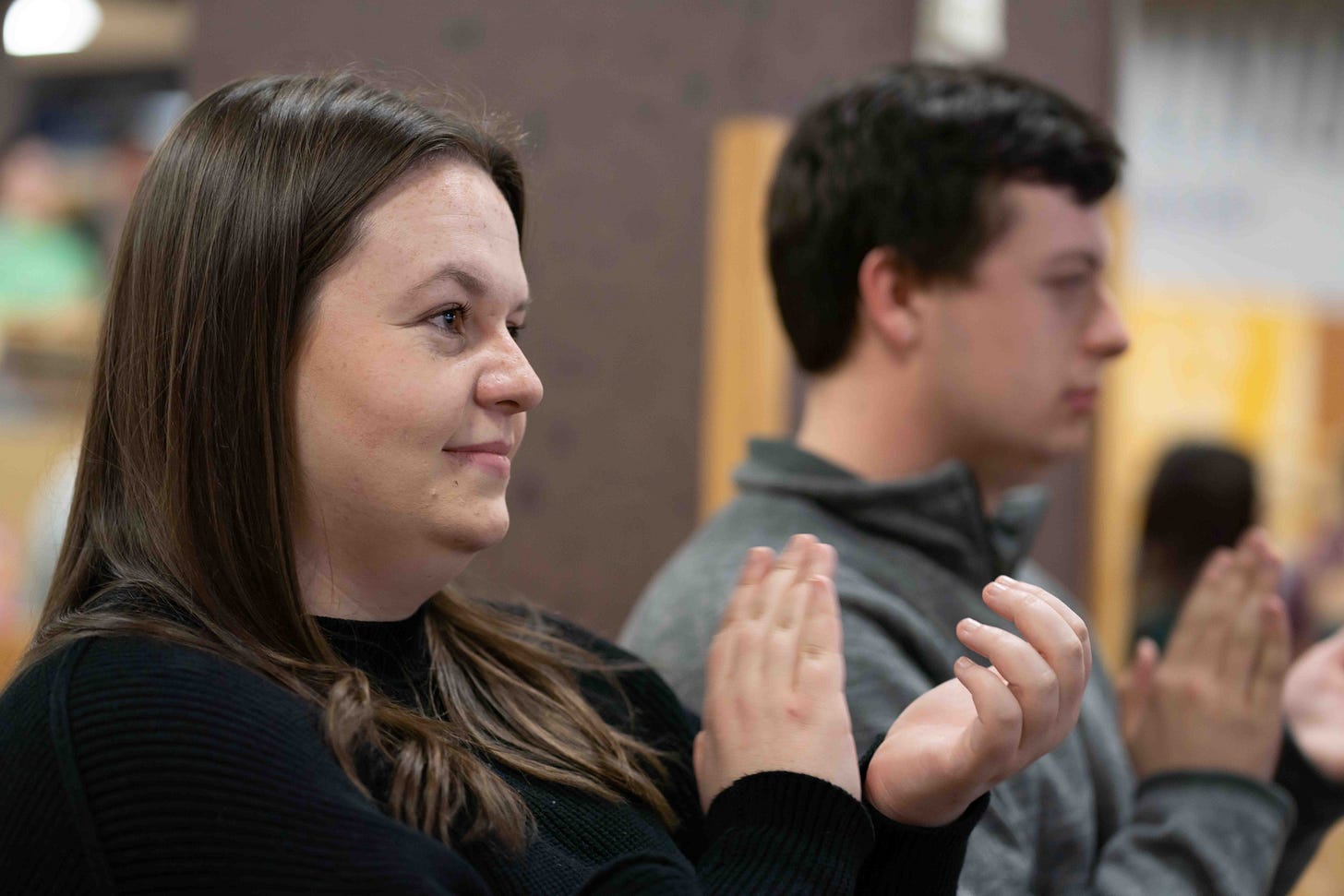
After announcing their win on Instagram, Smith and Petri disclosed that their campaign also received an election violation from the ASUW Judicial Council, which resulted in their social media being deactivated for a brief time.
It is currently unknown what the violation was and what, if any, additional sanctions the campaign might receive. This is not the first time the judicial council has stepped in after the announcement of the ASUW presidential winner.
One year ago, the council intervened during an argument between the recently elected ASUW president Allison Brown and UW Student Affairs. The latter attempted to use language within the ASUW by-laws to remove ASUW President Brown from her elected role, but Brown fought back to keep her seat.
“For the Dean of Students, a designee of their office, or the ASUW Assistant Director to remove a student from their position they were rightfully elected to in ASUW, by the student body, would be a gross misuse and grab of power,” states a judicial council document related to the affair. “This would cross the lines of students electing their peers to govern themselves and would plainly be an overreach into the student government, which is run by the students and for the students … A professional staff member removing a sitting member of ASUW would not only be wrong on moral grounds, but it would also be in direct violation of the ASUW By-Laws and Constitution.”
Student government autonomy has been an ongoing issue at UW for the past several years.
In late 2022, a portion of ASUW funds were frozen by the university after the ASUW Senate passed legislation related to one of their many student-funded endowments. The legislation in question would have allowed for the purchase of Plan B and pregnancy tests to be offered for free in the university’s onsite pharmacy and clinic for students.
While other funding delineated in the same legislation has now been unfrozen, the funding for Plan B and pregnancy tests remains frozen while ASUW and Student Affairs continue to negotiate.
The incident resulted in the creation of a special ASUW committee tasked with considering if it is in the student government's best interest to remain under the banner of Student Affairs, or move to instead report directly to the UW Board of Trustees concerning financial items.
The newly elected student senate will now inherit these ongoing issues during the transition period between the 110th and 111th ASUW administrations.
Ashton J. Hacke, who wrote this story, served as an ASUW senator in 2022 and worked on the ASUW legislation that sets aside funding for Plan B and pregnancy tests.

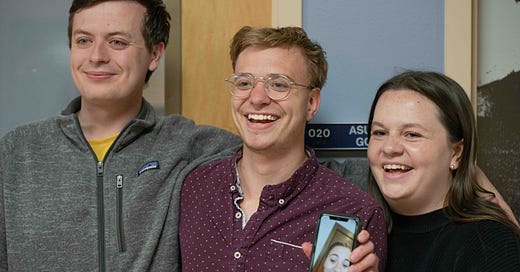



Foregoing Greek community endorsements for smaller student organizations or groups of students not associated with any RSO isn’t a new precedent in an ASUW Presidential election. Next time, consider a perspective beyond your own four year timeframe on campus.